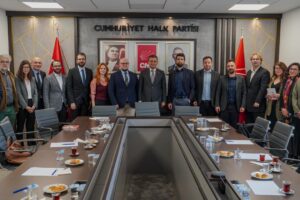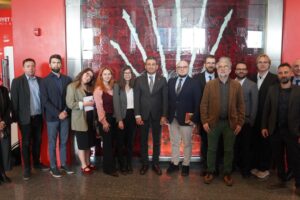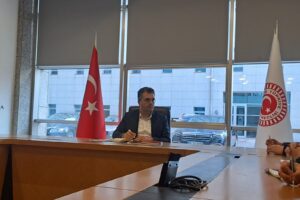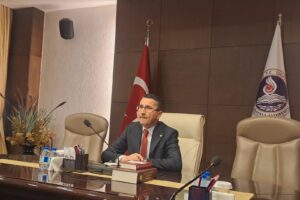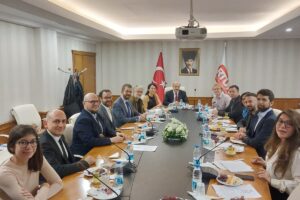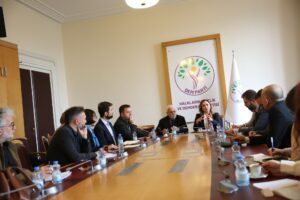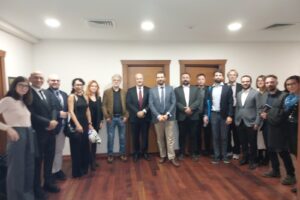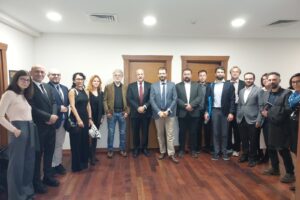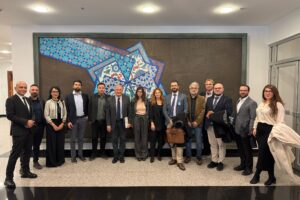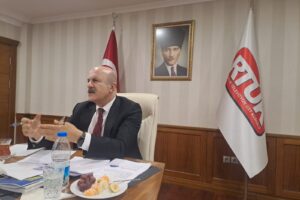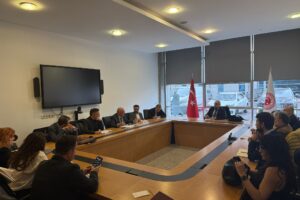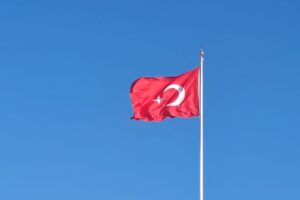5 December 2025: Joint letter to Ms. Ursula von der Leyen President and Ms. Marta Kos Vice-President – European Commission – Urgent Action Needed to Prevent the Collapse of BHRT and Safeguard Media Freedom and Security in Bosnia and Herzegovina
Mission to Turkey November 2025








Press release
Ankara, November 26, 2025 – A mission delegation composed of eight international press freedom, free expression and human rights organisations has concluded a joint press freedom mission to Türkiye. The delegation met with journalists, civil society, political party representatives, MPs, the judicial branch, regulatory bodies, and foreign diplomatic missions to discuss Türkiye’s rapidly deteriorating media freedom environment.
This seventh international press freedom mission to Türkiye, held in Ankara from 24 to 26 November 2025, was led by the International Press Institute (IPI) and included Amnesty International, ARTICLE 19 Europe, the Committee to Protect Journalists (CPJ), the European Centre for Press and Media Freedom (ECPMF) and Osservatorio Balcani Caucaso Transeuropa (OBCT) as part of Media Freedom Rapid Response (MFRR), Reporters Without Borders (RSF) and the South East Europe Media Organisation (SEEMO).
During the visit, the delegation held meetings with the Turkish Constitutional Court, the Radio and Television Supreme Council (RTÜK), the Delegation of the European Union to Türkiye, several foreign diplomatic missions, and representatives of Türkiye’s political landscape, including MPs from the Republican People’s Party (CHP) and the Peoples’ Equality and Democracy Party (DEM). The mission also met with the Association of Journalists in Ankara as well as members of the broader journalism community.
Despite multiple requests, government institutions, including the Directorate of Communications, the Ministry of Justice, Ministry of Interior, and several other ministries, as well as representatives of the AKP and MHP, declined to meet with the delegation or did not respond.
The mission delegation raised for consideration a wide variety of issues that have led to a further decline in press freedom in Türkiye, since our last mission in November 2024. The situation this year has been marked by a sharp escalation in political pressure, judicial harassment and censorship targeting the press.
Since 19 March 2025, high-profile detentions, including the imprisonment of opposition mayors and municipal officials that were largely viewed as politically motivated, were accompanied by large-scale protests that authorities met with mass detentions and restrictions on coverage. Journalists documenting the events faced early-morning police raids, physical assaults, and attempts from authorities to silence them, such as the warning from the former RTÜK chair that failure to “remain free from political bias” while covering protests would result in maximum penalties, including the revocation of licenses.
The mission delegation also highlighted a troubling pattern of punitive actions against critical outlets and journalists. Journalists across the country continue to face assault, threats, and intimidation, while criminal investigations and prosecutions against them remain commonplace. Prolonged arbitrary pre-trial detention and politically motivated investigations and prosecutions, such as those against journalists Furkan Karabay and Fatih Altaylı, reinforce the climate of fear and self-censorship.
Regulatory bodies continue to leverage their authority to silence dissent. As an institution with eroded independence that urgently needs reforms to restore its autonomy, RTÜK imposed heavy fines and broadcast bans targeting critical television outlets, a practice that deprives the public of critical voices. The Press Advertising Agency’s restrictive and one-sided criteria for distributing public advertising further strained the survival of local independent media. Although the Constitutional Court annulled parts of the agency’s mandate, economic pressure continues to serve as a tool of control. We also note with alarm the bandwidth throttling of social media platforms and messaging services during events of significant public interest, and the resurgence of “foreign influence” narratives used to justify interference in independent journalism.
The delegation urges Turkish authorities to end the judicial harassment of journalists, fully implement the decisions of the Constitutional Court on freedom of expression at all levels, and guarantee due process and fair trial rights. We call on regulators to cease arbitrary sanctions and repeat that they must operate independently and transparently. Türkiye must safeguard open debate, restore unrestricted digital access, and stop vilifying civil society or the press through vague accusations under its overly broad and vague criminal provisions including those in its anti-terrorism law, in violation of the country’s constitutional and international human rights obligations to protect the rights to freedom of expression, association and assembly. Türkiye should also respect international standards and practices in issuing press cards as a free decision of journalist associations and media.
Ensuring a safe, free and pluralistic media environment is essential to democracy, the rule of law, and the meaningful protection of human rights. The steps taken in 2025 have moved Türkiye further away from these standards. At the same time, the mission delegation underscores that ongoing peace negotiations could serve as a crucial opportunity to advance comprehensive reforms that strengthen journalists’ rights, safeguard pluralism and help rebuild respect for fundamental freedoms. We call on the authorities to reverse the current trajectory and to engage meaningfully with domestic and international stakeholders to uphold press freedom and freedom of expression.
Signed by:
International Press Institute (IPI)
Amnesty International
ARTICLE 19 Europe
Committee to Protect Journalists (CPJ)
European Centre for Press and Media Freedom (ECPMF) as part of MFRR
Osservatorio Balcani Caucaso Transeuropa (OBCT) as part of MFRR
Reporters Without Borders (RSF)
South East Europe Media Organisation (SEEMO)








Basın açıklaması
Ankara, 26 Kasım 2025 – Basın özgürlüğü, ifade özgürlüğü ve insan hakları odaklı çalışmalar yürüten sekiz uluslararası kuruluştan oluşan heyetimiz Türkiye’deki basın özgürlüğü misyonunu tamamladı. Heyet, Türkiye’nin giderek kötüleşen medya özgürlüğü koşullarına ilişkin endişelerini gazetecilere, sivil toplum temsilcilerine, siyasi parti yetkililerine, milletvekillerine, yargı organlarına, düzenleyici kuruluşlara ve diplomatik temsilciliklere iletti.
Uluslararası Basın Enstitüsü (IPI) öncülüğünde 24-26 Kasım 2025’te Ankara’da düzenlenen yedinci uluslararası basın özgürlüğü misyonuna Uluslararası Af Örgütü, ARTICLE 19, Gazetecileri Koruma Komitesi (CPJ), Avrupa Basın ve Medya Özgürlüğü Merkezi (ECPMF), Osservatorio Balcani Caucaso Transeuropa (OBCT), Sınır Tanımayan Gazeteciler (RSF) ve Güney Doğu Avrupa Medya Örgütü (SEEMO) katıldı.
Heyetin ziyaret ettiği kurumlar arasında Anayasa Mahkemesi, Radyo ve Televizyon Üst Kurulu (RTÜK), Cumhuriyet Halk Partisi (CHP), Halkların Eşitlik ve Demokrasi Partisi (DEM) ve bağımsız milletvekilleriyle Avrupa Birliği Türkiye Delegasyonu ve yabancı diplomatik temsilcilikler yer aldı. Ayrıca, Ankara Gazeteciler Cemiyeti ev sahipliğinde yapılan görüşmelerdeyse Türkiye’den basın özgürlüğü kuruluşlarıyla gazeteciler yer aldı.
İletişim Başkanlığı, Adalet Bakanlığı, İçişleri Bakanlığı ve diğer bakanlıklar da dahil çeşitli devlet kurumlarının yanı sıra Adalet ve Kalkınma Partisi (AKP) ve Milliyetçi Hareket Partisi (MHP) temsilcilerine gönderilen resmi görüşme taleplerine ya yanıt alınamadı ya da görüşme talepleri reddedildi.
Yapılan görüşmelerde, Kasım 2024’teki son misyondan bu yana Türkiye’de basın özgürlüğünü daha da zayıflatan çeşitli meseleler gündeme alındı. Heyet, 2025’te basına yönelik siyasi baskıların, yargı eliyle uygulanan yıldırma politikalarının ve sansürün artışına dikkat çekti.
19 Mart 2025’ten bu yana yaşanan gelişmelerde, muhalefet belediye başkanlarının ve yetkililerinin tutuklandığı, siyasi saikli olmakla eleştirilen sansasyonel davalar geniş çaplı protestolara yol açtı. Yetkililer bu protestolara kitlesel gözaltılar ve haber kısıtlamalarıyla karşılık verdi. Toplumsal olayları belgeleyen gazeteciler sabah saatlerinde yapılan ev baskınlarıyla gözaltına alındı, fiziksel saldırıya uğradı. Eski RTÜK Başkanı’nın, protestoları haberleştirirken siyasi tarafsızlıktan sapmaları halinde en ağır yaptırımların, hatta lisans iptallerinin uygulanacağı yönündeki uyarısı da dikkati çekiciydi.
Heyet, eleştirel medya kuruluşlarına ve gazetecilere yönelik kaygı verici cezaları da gündeme getirdi Gazeteciler gözdağı, tehdit ve fiziksel saldırılara maruz kalmaya devam ederken açılan davalar da yaygınlığını koruyor. Gazeteci Furkan Karabay ve Fatih Altaylı örneklerindeki gibi, uzun süren tutuklu yargılama ve siyasi saikle ilerleyen cezai süreçler korku ve otosansür ortamını pekiştiriyor.
Düzenleyici kurumlar da yetkilerini kötüye kullanarak muhalif sesleri susturmaya devam ediyor. Bağımsızlığı ciddi ölçüde aşınmış, özerkliğini yeniden tesis etmek için kapsamlı reformlara ihtiyaç duyan RTÜK’ün, eleştirel televizyon kanallarına uyguladığı ağır para cezaları, yayın yasakları ve ekran karartmaları kamuoyunu bağımsız seslere erişmekten mahrum bırakıyor. Basın İlan Kurumu’nun (BİK) kamu ilanlarının dağıtımındaki kısıtlayıcı kriterleri, yerel ve bağımsız medya kuruluşlarının ayakta kalma mücadelesini zorlaştırıyor. Anayasa Mahkemesi, BİK’in bazı yetkilerini iptal etmiş olsa da ekonomik baskı bir kontrol aracı olarak varlığını sürdürüyor.
Heyet ayrıca toplumsal öneme sahip olaylar esnasında sosyal medya platformları ve mesajlaşma uygulamalarına erişimin kısıtlanmasının ve bağımsız gazeteciliğe yönelik müdahaleleri meşrulaştırmak için yeniden dolaşıma sokulan “etki ajanlığı” söylemlerinin endişe verici biçimde arttığını vurguladı.
Yetkililer, yargı eliyle gazetecileri yıldırma politikalarının önüne geçip, Anayasa Mahkemesi’nin ifade özgürlüğüne ilişkin olumlu kararlarını uygulamalı ve adil yargılanma hakkını güvence altına almalı. Düzenleyici kuruluşları keyfi yaptırımları sonlandırmaya ve basın denetim organlarının bağımsız ve şeffaf bir şekilde faaliyet göstermesini sağlamaya davet ediyoruz. Türkiye özgür tartışma ortamını korumalı, dijital erişim sınırlamalarına son vermeli ve hem sivil toplumu hem de basını terörle mücadele de dahil muğlak ceza hükümleriyle hedef almaktan vazgeçmeli. Ayrıca, uluslararası standartlara uyarak basın kartlarının gazeteci dernekleri ve medya kuruluşlarının özgür kararıyla verilmesinin önünü açılmalı.
Özgür, çoğulcu ve güvenli bir medya ortamı demokrasi, hukukun üstünlüğü ve insan hakları için hayati öneme sahip. 2025’teki gelişmeler Türkiye’yi bu standartlardan daha da uzaklaştırdı. Fakat halihazırda devam eden barış müzakereleri, gazetecilerin haklarını güçlendirmenin, çoğulculuğu güvence altına almanın ve temel özgürlüklere riayeti yeniden tesis etmenin önünü açacak kapsamlı reformlar konusunda yol almak için fırsatlar sunuyor. Misyon heyeti olarak yetkilileri, Türkiye’nin mevcut gidişatını tersine çevirerek basın ve ifade özgürlüğünü korumak için ulusal ve uluslararası taraflarla işbirliği yapmaya çağırıyoruz.
İmzalayanlar:
Uluslararası Basın Enstitüsü (IPI)
ARTICLE 19 Europe
Avrupa Basın ve Medya Özgürlüğü Merkezi (ECPMF) — Medya Özgürlüğü Acil Müdahale (MFRR) partneri
Gazetecileri Koruma Komitesi (CPJ)
Güney Doğu Avrupa Medya Örgütü (SEEMO)
Osservatorio Balcani Caucaso Transeuropa (OBCT) — Medya Özgürlüğü Acil Müdahale (MFRR) partneri
Sınır Tanımayan Gazeteciler (RSF)
Uluslararası Af Örgütü
Interview with SEEMO member Anna Babinets (October 2025)
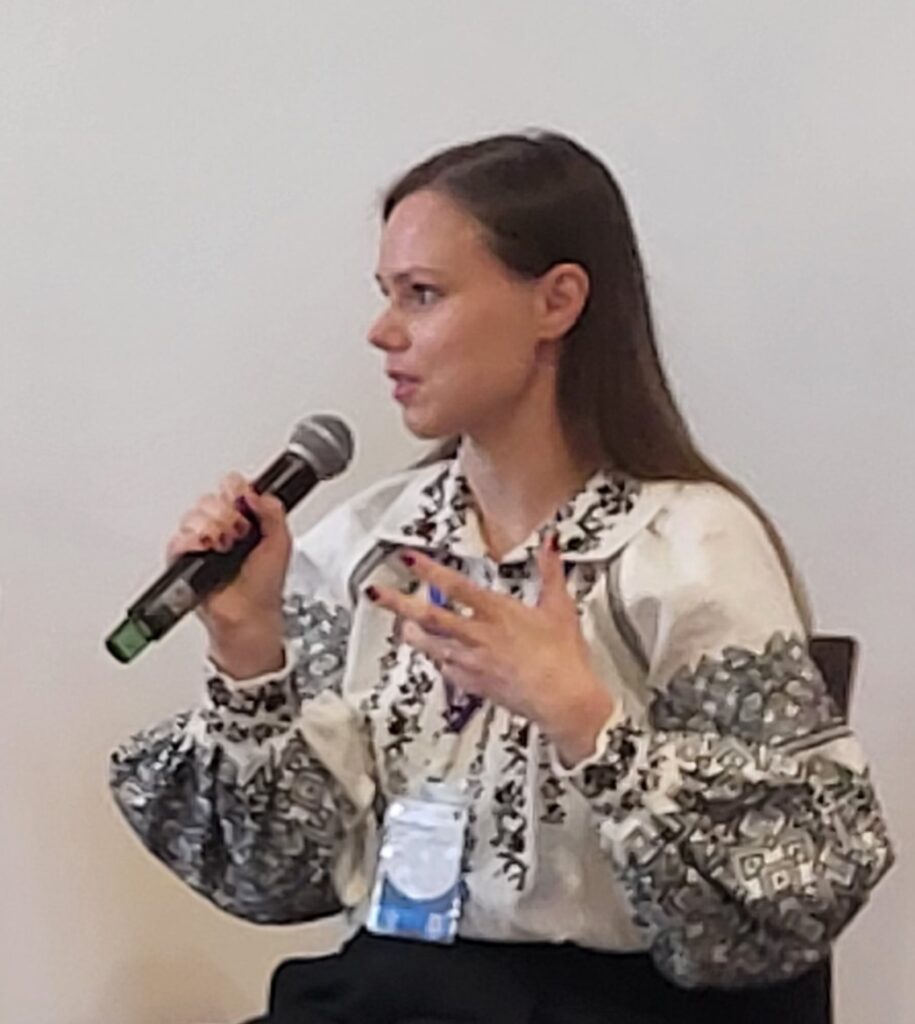
Anna Volodymyrivna Babinets, born 12 June 1984, is an investigative journalist from Ukraine and SEEMO member. She is the head of the independent investigative agency Slidstvo.info, a regional editor of the Organized Crime and Corruption Reporting Project (OCCRP), and a member of YanukovychLeaks.
9 July 2025: Ireland: Defamation Bill fails to protect public interest speech
On 2 July, the Dáil passed the Defamation (Amendment) Bill by 83 votes to 61. The undersigned organisations are deeply disappointed that, although the Bill contains anti-SLAPP provisions, it fails to include the robust safeguards required to meaningfully protect public interest speech. Nearly a decade after the review of the Defamation Act 2009 began, this is a frustrating outcome and a missed opportunity to protect the freedom of expression that is the lifeblood of our democracy.
The Ireland Anti-SLAPP Network – a coalition of civil society organisations, media lawyers, and academics – has engaged with the government throughout this process in an effort to improve the Bill. We had proposed three targeted amendments that would have significantly strengthened the legislation. None of these have been incorporated.
While the Bill brings in provisions that give effect to aspects of the EU Anti-SLAPP Directive – its application to domestic defamation cases is welcome – it falls short of transposing the Directive’s full set of minimum standards and protections, which Ireland is legally required to implement in full by May 2026. The anti-SLAPP provisions in the Bill apply only to defamation proceedings, even though SLAPPs frequently exploit other causes of action including privacy, copyright, and data protection to intimidate and silence public interest speech. The government has provided no clear explanation of how it intends to extend protections beyond defamation in line with its EU obligations.
The legislation also omits key components of the Directive that could have been readily included. These include provision for third-party interventions in support of SLAPP defendants (Article 9), security for damages (Article 10) and a reversal of the burden of proof (Article 12).
The legislation also fails to incorporate the protections against SLAPPs initiated in non-EU countries (Articles 16 and 17). By failing to incorporate these core safeguards, the Irish government exposes itself to potential infringement proceedings from the European Commission.
The government could and should have drawn on established international best practices, including the Council of Europe’s Recommendation on countering the use of SLAPPs. This Recommendation includes vital safeguards, such as an automatic stay of proceedings while an early dismissal motion is being heard, which are designed to protect against abusive litigation. It provides clear, practical guidance for safeguarding free expression and democratic accountability. Yet the government appears to have almost entirely disregarded it.
As the Bill goes to the Seanad today, the undersigned organisations call on senators to make the necessary amendments in order to ensure that Ireland seizes the opportunity to protect freedom of expression. If the current Bill is passed into law, journalists, human and environmental rights defenders, academics, and whistleblowers will remain vulnerable to abusive litigation aimed at silencing them.
Jessica Ní Mhainín, Head of Policy and Campaigns at Index on Censorship, said: “It is ironic that this piece of legislation was passed in the Dáil on European Day of Action against SLAPPs because it completely fails to offer meaningful protection to SLAPP defendants. Its complex and flawed provisions risk becoming tools only accessible to those with significant legal resources — not the individuals most often targeted with SLAPPs. We need the senators to take action now to stop this inadequate Bill from being passed into law.”
Dr Francesca Farrington, Convener of the Anti-SLAPP Research Hub and Lecturer in Law at University of Aberdeen, said: “The Dáil has failed to fully transpose the minimum standards and protections required by the Directive. At a time of great threat to democracy, the rule of law, and human rights, the government has missed a vital opportunity to champion freedom of expression and protect public watchdogs. If the directive is a floor, not a ceiling, this is somewhere in the basement, but there is still time to level up.”
Dr Eoin O’Dell, Associate Professor of Law in Trinity College Dublin, said: “For a reform process that started with so much promise, the Bill has been a series of missed opportunities and profound disappointments.
Nowhere is this clearer than in respect of its anti-SLAPP provisions, which are so grudging that they will be impotent in practice.”
Signed
Index on Censorship
Anti-SLAPP Research Hub, University of Aberdeen
ARTICLE 19 Europe
Association of European Journalists
Blueprint for Free Speech
Civic Initiatives (Serbia)
ClientEarth
Coalition For Women In Journalism
Committee to Protect Journalists
European Federation of Journalists (EFJ)
Foundation Atelier for Community Transformation – ACT, BiH
Free Press Unlimited (FPU)
Global Witness
IFEX
Institute for Mass Media – IMME (Cyprus)
International News Safety Institute (INSI)
International Press Institute (IPI)
The Irish Council for Civil Liberties
Justice for Journalists Foundation (JFJ)
National Union of Journalists
PEN International
Rainforest Rescue
Reporters Shield
South East Europe Media Organisation (SEEMO)
Spotlight on Corruption (UK)
The Daphne Caruana Galizia Foundation
The Gemini Project
Transparency International Ireland
Wikimedia Europe
11 September 2025: Türkiye / Turkey- Stop throttling social media platforms
11 September 2025 – Türkiye is increasingly throttling social media platforms and messaging apps to silence online communication at moments of profound political or social importance. SEEMO joins the undersigned human rights an press freedom organisations in condemning Türkiye’s actions, which isolate people from vital information, and stifle democratic participation. Türkiye must correct course and uphold its international human rights obligations.
On 7 September at 23:45, major social media platforms and messaging services X, Instagram, YouTube, TikTok, Facebook, WhatsApp, Telegram, and Signal became inaccessible in Istanbul for approximately 21 hours.
The bandwidth throttling coincided with a police blockade of the main opposition Republican People’s Party (CHP) Istanbul headquarters. The blockade triggered a call from CHP’s Istanbul Youth Branch to gather in front of the building at 23.00 on 7 September, in protest against a temporary injunction by an Istanbul court suspending the Party’s provincial leadership and replacing it with ‘trustees’, a decision some legal experts say was beyond the court’s jurisdiction. On 11 September, a court in Ankara rejected the case for the annulment of the Party’s İstanbul provincial congress on substantive grounds.
The throttling of platforms was accompanied by attacks on peaceful assembly and growing pressure on media reporting on the tense situation. On 8 September, the police forcibly entered the CHP headquarters together with the court-appointed trustee, deploying tear gas against demonstrators, journalists, party members and staff both outside and inside the building. At least 10 people were reportedly detained and handcuffed. The Istanbul Governor’s Office had already issued a ban on public gatherings in six districts starting at 20:00 on 7 September and lasting until 11 September. In addition, the president of the Radio and Television Supreme Council (RTÜK) warned on X that outlets ‘undermining social peace and public safety’ would face administrative fines, broadcasting suspensions and, ultimately, licence revocations. This comes after major independent broadcasters TELE1, Halk TV, and SZC TV were hit with broadcast bans in recent months.
No official explanation has been provided for the throttling as of 11 September. Under Article 60/10 of the Electronic Communications Law (Law No. 5809), the Presidency may order the Information and Communication Technologies Authority (BTK) to restrict communications without a court order where there is peril in delay, citing national security, public order, or other grounds listed under Article 22 of the Constitution. These administrative restrictions are temporary and must be brought to the judiciary within 24 hours. The competent court is required to render a decision within 48 hours thereafter. This means that communication can be cut for up to 72 hours without judicial approval. Article 60/10 was added to the Electronic Communications Law in August 2016 with a State of Emergency Decree and codified into law in November of the same year.
Türkiye’s throttling habit
Türkiye has a documented pattern of throttling social media platforms and messaging apps during critical events, including the February 2023 earthquakes when Twitter was throttled for about 12 hours despite urgent rescue efforts relying on it. Another example is the throttling of Instagram, YouTube, Facebook and Twitter after a bombing in November 2022.
The latest shutdown marks the second in recent months. When CHP’s 2028 presidential candidate and then-Istanbul Mayor was detained in March 2025, X, TikTok, YouTube Instagram, and Telegram were throttled in Istanbul for 42 hours. This time, the government escalated its repression by including Signal and Whatsapp, the most widely used mobile application in the country. Accessing throttled platforms and messaging
services through VPNs is not a reliable alternative in Türkiye, as most major providers have already been blocked for several years.
These restrictions are often imposed with little to no explanation. Platforms and messaging services are throttled and then quietly restored, leaving the public in a state of uncertainty. They limit the ability of journalists to report developing events of intense public interest, restrict access to vital information and stifle political dissent during moments when the public most needs open and free communication.
Türkiye’s actions are in clear violation of international human rights law. As emphasised by the Office of the United Nations High Commissioner for Human Rights (OHCHR), ‘given their indiscriminate and disproportionate impacts on human rights, States should refrain from the full range of internet shutdowns’. Any restriction on freedom of expression, including the blocking of certain platforms, must be based on a clear legal basis, necessary to achieve a legitimate aim, and proportionate to the legitimate aim pursued. According to the OHCHR, any internet shutdown, including targeted ones, must further be subject to prior authorisation by a court or other independent adjudicatory body and communicated in advance to the service providers with a clear legal explanation and details regarding scope and duration. In addition, governments must provide redress mechanisms, including through judicial proceedings, to those whose rights have been affected. Türkiye repeatedly violates these requirements. It instead uses throttling measures as convenient tools in its arsenal to block people’s access to
information in politically sensitive times and to limit scrutiny of its actions.
The undersigned human rights and press freedom organisations urge Türkiye to refrain from throttling social media platforms and messaging services. Türkiye must stop its consistent crackdown on dissenting voices and the media and uphold its international human rights obligations.
Signatories:
ARTICLE 19
ARTICOLO 21
Civic Space Studies Association (CSSA)
EuroMed Rights Network
European Centre for Press and Media Freedom (ECPMF)
European Federation of Journalists (EFJ)
Human Rights Watch (HRW)
International Federation for Human Rights (FIDH), in the framework of
the Observatory for the Protection of Human Rights Defenders
International Press Institute (IPI)
Media and Law Studies Association (MLSA)
PEN Denmark
PEN International
P24 Platform for Independent Journalism
South East Europe Media Organisation (SEEMO)
World Organisation Against Torture (OMCT), in the framework of the
Observatory for the Protection of Human Rights Defenders
30 September 2025: Letter to Officials in Germany, Italy and Czech Republic
Chancellor of Germany, Friedrich Merz
Federal Chancellery
Willy-Brandt-Straße 1
10557 Berlin
Germany
CC:
Federal Minister for Foreign Affairs, Johann Wadephul
Minister of State for Europe, Gunther Krichbaum
Federal Minister of Finance, Lars Klingbeil
September 30 2025
Re: Immediate suspension of the EU-Israel Association Agreement
Dear Chancellor,
We, the undersigned press freedom and journalist organizations, are writing to urge the German government to call for a partial or full suspension of the EU-Israel Association Agreement in order to protect journalists in Gaza and to advance our collective ability to access independent reporting.
The Israeli government and Israel Defense Forces are engaging in the deadliest and most deliberate effort to kill and silence journalists that press freedom organizations have ever documented. Palestinian journalists are being threatened, directly targeted and murdered by Israeli forces, and are arbitrarily detained and tortured in retaliation
for their work. Media infrastructure in Gaza is systematically destroyed, and censorship has been tightened throughout the West Bank, Jerusalem and Israel. The Israeli government has also taken the unprecedented step of refusing international media independent access to Gaza.
European public opinion on Gaza is changing, in part as a result of the reporting from Palestinian journalists on the ground. Their journalism -the stories, the personal accounts, and the images- has been a testament to the horrors suffered by the Palestinian people. It is imperative that all EU Member States continue to support Palestinian journalists as they carry out their work, while also advocating for international media–including German journalists–to have independent access to Gaza.
EU Member States are increasingly in support of suspending certain trade-related provisions of the Association Agreement between the EU and Israel– which is now a formal proposal made by the European Commission.
We kindly urge the German government to:
immediately and publicly express Germany’s support for the partial or full suspension of the EU-Israel Association Agreement, and encourage other EU Member States to follow suit;
strengthen the calls on Israel to immediately allow the urgent delivery of food, clean water, and medical supplies to all journalists in Gaza through protected humanitarian corridors;
strengthen the calls on Israel to end the blockade on foreign press entry into Gaza;
and robustly demand the independent investigation and prosecution of those responsible for the starvation and killing of journalists (in line with the 2015 Security Council Resolution 2222 on the protection of journalists in armed conflict).
This is a defining moment for Europe to defend its international reputation to uphold human rights and we call on Germany to take action.
Signed by:
ARTICLE 19
Association of European Journalists in Belgium
Committee to Protect Journalists (CPJ)
European Centre for Press and Media Freedom (ECPMF)
European Federation of Journalists (EFJ)
Free Press Unlimited (FPU)
IFEX
Index on Censorship
International News Safety Institute (INSI)
International Press Institute (IPI)
Media Diversity Institute
Osservatorio Balcani e Caucaso Transeuropa (OBCT)
Ossigeno per l’infomazione, Ossigeno.info
Reporter ohne Grenzen e.V. (RSF)
South East Europe Media Organisation (SEEMO)
Spanish Federation of Associations of Journalists (FAPE)
The Daphne Caruana Galizia Foundation
Minister of Italy, Giorgia Meloni
Palazzo Chigi
Piazza Colonna 370
00187 Rome
Italy
CC:
Minister of Foreign Affairs, Antonio Tajani
Minister of European Affairs, Tommaso Foti
Minister of Economy and Finance, Giancarlo Giorgetti
September 30 2025
Re: Immediate suspension of the EU-Israel Association Agreement
Dear Prime Minister,
We, the undersigned press freedom and journalist organizations, are writing to urge the Italian government to call for a partial or full suspension of the EU-Israel Association Agreement in order to protect journalists in Gaza and to advance our collective ability to access independent reporting.
Israel is engaging in the deadliest and most deliberate effort to kill and silence journalists that press freedom organizations have ever documented. Palestinian journalists are being threatened, directly targeted and murdered by Israeli forces, and are arbitrarily detained and tortured in retaliation for their work. Media infrastructure in Gaza is systematically destroyed, and censorship has been tightened throughout the West Bank, Jerusalem and Israel. Israel has also taken the unprecedented step of refusing international media independent access to Gaza.
European public opinion on Gaza is changing, in part as a result of the reporting from Palestinian journalists on the ground. Their journalism–the stories, the personal accounts, and the images–has been a testament to the horrors suffered by the Palestinian people. It is imperative that all EU Member States continue to support Palestinian journalists as they carry out their work, while also advocating for international media–including Italian journalists–to have independent access to Gaza.
A sense of outrage is also mounting in the journalist community, including public actions attended by hundreds of Italian journalists and a written appeal made by 32 Italian newspapers addressed to the Italian government calling for journalist access to Gaza.
EU Member States are increasingly in support of suspending certain trade-related provisions of the Association Agreement between the EU and Israel– which is now a formal proposal made by the European Commission.
We kindly urge the Italian government to:
immediately and publicly express Italy’s support for the partial or full suspension of the EU-Israel Association Agreement, and encourage other EU Member States to follow suit;
strengthen the calls on Israel to immediately allow the urgent delivery of food, clean water, and medical supplies to all journalists in Gaza through protected humanitarian corridors;
strengthen the calls on Israel to end the blockade on foreign press entry into Gaza;
and robustly demand the independent investigation and prosecution of those responsible for the starvation and killing of journalists (in line with the 2015 Security Council Resolution 2222 on the protection of journalists in armed conflict).
This is a defining moment for Europe to defend its international reputation to uphold human rights and we call on Italy to take action.
Signed by:
ARTICLE 19
Association of European Journalists in Belgium
Committee to Protect Journalists (CPJ)
European Centre for Press and Media Freedom (ECPMF)
European Federation of Journalists (EFJ)
Free Press Unlimited (FPU)
IFEX
Index on Censorship
International News Safety Institute (INSI)
International Press Institute (IPI)
Media Diversity Institute
Osservatorio Balcani e Caucaso Transeuropa (OBCT)
Ossigeno per l’infomazione, Ossigeno.info
Reporters Without Borders (RSF)
South East Europe Media Organisation (SEEMO)
Spanish Federation of Associations of Journalists (FAPE)
The Daphne Caruana Galizia Foundation
President of the Czech Republic, Petr Pavel
Office of the President of the Republic
Hrad I. nádvoří č. p. 1, Hradčany
119 08 Prague 1
Czech Republic
Prime Minister of the Czech Republic, Petr Fiala
Government Office of the Czech Republic
nábřeží Edvarda Beneše 4
118 01 Prague 1
Czech Republic
CC:
Minister of Foreign Affairs, Jan Lipavský
Minister of European Affairs, Martin Dvořák
Minister of Finance, Zbyněk Stanjura
September 30 2025
Re: Immediate suspension of the EU-Israel Association Agreement
Dear President,
Dear Prime Minister,
We, the undersigned press freedom and journalist organizations, are writing to urge the Czech government to call for a partial or full suspension of the EU-Israel Association Agreement in order to protect journalists in Gaza and to advance our collective ability to access independent reporting.
Israel is engaging in the deadliest and most deliberate effort to kill and silence journalists that press freedom organizations have ever documented. Palestinian journalists are being threatened, directly targeted and murdered by Israeli forces, and are arbitrarily detained and tortured in retaliation for their work. Media infrastructure in Gaza is systematically destroyed, and censorship has been tightened throughout the West Bank, Jerusalem and Israel. Israel has also taken the unprecedented step of refusing international media independent access to Gaza.
European public opinion on Gaza is changing, in part as a result of the reporting from Palestinian journalists on the ground. Their journalism–the stories, the personal accounts, and the images–has been a testament to the horrors suffered by the Palestinian people. It is imperative that all EU Member States continue to support Palestinian journalists as they carry out their work, while also advocating for international media–including Czech journalists–to have independent access to Gaza.
A sense of outrage is mounting in the journalist community, including the open letter sent by 262 Czech journalists, addressed to you Mr President and the Czech government, in support of journalists in Gaza.
EU Member States are increasingly in support of suspending certain trade-related provisions of the Association Agreement between the EU and Israel– which is now a formal proposal made by the European Commission.
We kindly urge the Czech government to:
immediately and publicly express the Czech Republic’s support for the partial or full suspension of the EU-Israel Association Agreement, and encourage other EU Member States to follow suit;
strengthen the calls on Israel to immediately allow the urgent delivery of food, clean water, and medical supplies to all journalists in Gaza through protected humanitarian corridors;
call on Israel to end the blockade on foreign press entry into Gaza;
and robustly demand the independent investigation and prosecution of those responsible for the starvation and killing of journalists (in line with the 2015 Security Council Resolution 2222 on the protection of journalists in armed conflict).
This is a defining moment for Europe to defend its international reputation to uphold human rights and we call on the Czech Republic to take action.
Signed by:
ARTICLE 19
Association of European Journalists in Belgium
Committee to Protect Journalists (CPJ)
European Centre for Press and Media Freedom (ECPMF)
European Federation of Journalists (EFJ)
Free Press Unlimited (FPU)
IFEX
Index on Censorship
International News Safety Institute (INSI)
International Press Institute (IPI)
Media Diversity Institute
Osservatorio Balcani e Caucaso Transeuropa (OBCT)
Ossigeno per l’infomazione, Ossigeno.info
Reporters Without Borders (RSF)
South East Europe Media Organisation (SEEMO)
Spanish Federation of Associations of Journalists (FAPE)
The Daphne Caruana Galizia Foundation
Prezident České republiky, Petr Pavel
Kancelář prezidenta republiky
Hrad I. nádvoří č. p. 1, Hradčany
119 08 Praha 1
Česká republika
Premiér České republiky, Petr Fiala
Úřad vlády České republiky
nábřeží Edvarda Beneše 4
118 01 Praha 1
Česká republika
Kopie:
Ministr zahraničních věcí, Jan Lipavský
Ministr pro evropské záležitosti, Martin Dvořák
Ministr financí, Zbyněk Stanjura
září 2025
Věc: Okamžité pozastavení Asociační dohody mezi EU a Izraelem
Vážený pane prezidente,
Vážený pane premiére,
My, níže podepsané organizace pro svobodu tisku a novinářské organizace, se obracíme na českou vládu s žádostí o částečné nebo úplné pozastavení Asociační dohody mezi EU a Izraelem s cílem ochránit novináře v Gaze a posílit naši kolektivní schopnost přístupu k nezávislému zpravodajství.
Izrael se zapojuje do nejsmrtelnějšího a nejpromyšlenějšího úsilí o zabíjení a umlčování novinářů, jaké kdy organizace pro svobodu tisku zdokumentovaly. Palestinští novináři jsou izraelskými silami ohrožováni, přímo terčem útoků a vražděni a jsou svévolně zadržováni a mučeni jako odveta za svou práci. Mediální infrastruktura v Gaze je systematicky ničena a cenzura byla zpřísněna na celém Západním břehu Jordánu, v
Jeruzalémě a Izraeli. Izrael také učinil bezprecedentní krok a odmítl mezinárodním médiím nezávislý přístup do Gazy.
Evropské veřejné mínění o Gaze se mění, částečně v důsledku reportáží palestinských novinářů z terénu. Jejich žurnalistika – příběhy, osobní svědectví a fotografie – je svědectvím o hrůzách, které palestinský lid trpí. Je nezbytné, aby všechny členské státy EU i nadále podporovaly palestinské novináře při výkonu jejich práce a zároveň se zasazovaly o to, aby mezinárodní média – včetně českých novinářů – měla nezávislý
přístup do Gazy.
V novinářské komunitě narůstá pocit pobouření, včetně otevřeného dopisu, který 262 českých novinářů zaslalo Vám, pane prezidente, a české vládě, na podporu novinářů v Gaze.
Členské státy EU stále více podporují pozastavení některých obchodních ustanovení dohody o přidružení mezi EU a Izraelem – což je nyní formální návrh Evropské komise.
Vyzýváme českou vládu, aby:
okamžitě a veřejně vyjádřila podporu České republiky částečnému nebo úplnému pozastavení dohody o přidružení mezi EU a Izraelem a vyzvala ostatní členské státy EU, aby následovaly tento příklad;
zesílila výzvy Izraeli, aby okamžitě umožnil naléhavé dodávky potravin, čisté vody a zdravotnického materiálu všem novinářům v Gaze prostřednictvím chráněných humanitárních koridorů;
vyzvala Izrael, aby ukončil blokádu vstupu zahraničních tiskových služeb do Gazy;
a důrazně požadovala nezávislé vyšetřování a stíhání osob odpovědných za
hladovění a zabíjení novinářů (v souladu s rezolucí Rady bezpečnosti OSN č. 2222 o ochraně novinářů v ozbrojeném konfliktu z roku 2015).
Toto je rozhodující okamžik pro Evropu, aby bránila svou mezinárodní pověst v oblasti dodržování lidských práv, a vyzýváme Českou republiku, aby podnikla kroky.
Níže podepsaní:
ARTICLE 19
Association of European Journalists in Belgium
Committee to Protect Journalists (CPJ)
European Centre for Press and Media Freedom (ECPMF)
European Federation of Journalists (EFJ)
Free Press Unlimited (FPU)
IFEX
Index on Censorship
International News Safety Institute (INSI)
International Press Institute (IPI)
Media Diversity Institute
Osservatorio Balcani e Caucaso Transeuropa (OBCT)
Ossigeno per l’infomazione, Ossigeno.info
Reporters Without Borders (RSF)
South East Europe Media Organisation (SEEMO)
Spanish Federation of Associations of Journalists (FAPE)
The Daphne Caruana Galizia Foundation
9 June 2025: SEEMO and other IFEX members calls on the Venezuelan government to immediately release Eduardo Torres
We, the undersigned civil society organisations, are writing to you urgently to request the immediate release of Eduardo Torres, a lawyer, teacher, trade unionist, and human rights defender, and a member of the Venezuelan Program for Human Rights Education-Action (PROVEA), who is currently detained, isolated, and incommunicado.
On May 9, 2025, Eduardo disappeared and for eight days there was no information on his whereabouts. Although officials finally publicly acknowledged his detention on May 13, there was no further are also unknown. Eduardo’s family and lawyers submitted a habeas corpus appeal, which judicial authorities information provided regarding the date, time, place or security force that carried out the arrest. There has also been no information from the Prosecutor’s Office that would be responsible for overseeing an investigation, nor on the existence of any arrest warrant. Charges against him initially rejected, before accepting it on May 12. The appeal is still pending a response.
The process against Eduardo Torres has lacked transparency and access to timely information for his family and legal counsel of his own choosing. A month later, neither family members nor trusted lawyers have had any kind of contact with him and have not been able to verify his conditions of detention or health situation. The family have only been able to contact the public defender assigned to his case, who informed them that
there is a visitation ban for Eduardo, thus violating his right to due process, communication and legitimate defence.
Concerned stakeholders, including international human rights protection systems such as the Inter-American Commission on Human Rights, United Nations bodies, and hundreds of international organizations have demanded his immediate release.
We take this opportunity to remind the Venezuelan authorities that, in accordance with the Universal Declaration of Human Rights, the International Covenant on Civil and Political Rights and other relevant international human rights standards, they must guarantee that human rights defenders can carry out their work freely and safely, without fear of harassment, reprisals or imprisonment.
We urge you as an authority of the State of Venezuela to take measures that will:
Allow Eduardo regular communication with family members and trusted lawyers, in compliance with international and constitutional legal obligations and in respect for his right to due process; Facilitate his access to his trusted lawyers; and Grant his full and immediate release.
Signed,
Alianza Regional por la Libre Expresión e Información
Artículo 19 (Mexico and Central America)
Association for Freedom of Thought and Expression (AFTE)
Belarusian Association of Journalists
Canadian Journalists for Free Expression
Centre for Media and Society (CEMESO)
Centro de Archivos y Acceso a la Información Pública
Committee to Protect Journalists (CPJ)
Derechos Digitales
Freedom of Expression Institute (FXI)
Global Voices
Global Voices Advox
IFoX / Initiative for Freedom of Expression- Turkey
Independent Journalism Center (IJC)
Index on Censorship
Instituto de Prensa y Libertad de Expresión – IPLEX
Instituto Prensa y Sociedad
Media Institute of Southern Africa (MISA)
National Press Association
OpenMedia
Pacific Islands News Association (PINA)
Palestinian Center for Development and Media Freedoms (MADA)
PEN America
PEN Canada
SFLC.in
South East Europe Media Organisation (SEEMO)



